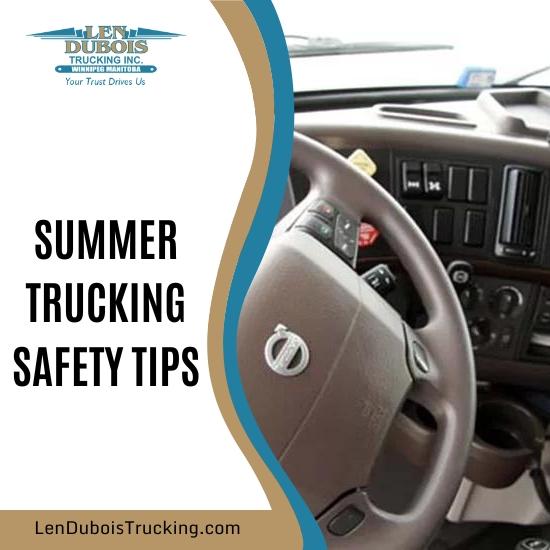 Summer Trucking Safety
Summer Trucking Safety
What’s not to love about summer? Nice weather, a beautiful and scenic drive, and no bitter cold nor the challenges of trucking in the winter. Trucking is a pretty sweet gig in the summer.
But trucking in the summer has its own challenges. From severe weather to melting heat to increased traffic on the roadways – truck drivers need to prepare for the challenges of crisscrossing the continent during the summer months.
Whether you’re a seasoned truck driver or just starting your career in the industry, it’s crucial to prioritize safety during this time of increased traffic and potential hazards.
Proper Pre-Trips
Before embarking on any trip, a thorough pre-trip inspection is vital for your safety and the safety of others on the road.
Proper pre-trip inspections are important for proper fleet maintenance. Not only is it required by law, but finding problems at the yard before we leave on a run will save a problem down the road, more specifically, a costly repair on the side of the road. It’s a nice feeling to be able to get a good start to a run, confident that our equipment is in good working order.
By conducting a proper pre-trip, you can proactively address any mechanical or safety concerns, minimizing the chances of encountering problems during your journey.
Pre-Trip Inspection: The Walk Around
Pre-Trip Inspection: Under the Hood
Stay Hydrated
The sweltering summer temperatures can pose risks for truckers spending long hours on the road. Dehydration can lead to dizziness, fatigue, and impaired cognitive function. Always keep a sufficient supply of water in your truck and drink regularly, even if you don’t feel thirsty. Remember, staying hydrated helps you maintain focus, alertness, and overall well-being.
Driver Health: Know the signs of heatstroke https://lenduboistrucking.com/blog/driver-health-know-signs-heatstroke/
Use Sunblock While Driving
You know the potential dangers of prolonged exposure to UV Rays, and the best method of protection is to cover up and wear sunscreen. But did you know that, even in your cab, you are exposed to harmful UV rays that can lead to skin damage and skin cancer?
Here are some things you should know about UV rays.
- The cab window typically protects against UVB rays. These are the main cause of sunburn and the leading cause of most skin cancers.
- The cab window typically does not protect against UVA rays. These rays damage the skin’s DNA, cause the cells to age, and can lead to some skin cancers.
- UV rays are strongest between 10 a.m. and 4 p.m.
- Overexposure to UV rays causes the skin to lose its ability to repair itself.
- UV rays are not just a summer problem; you are exposed to UV rays all year round.
- UV rays are not diminished by cold temperatures or cloud cover.
- One in seven Canadians will develop skin cancer in their lifetime.
- Truckers are at a higher risk of skin damage and skin cancer due to their prolonged exposure to UV rays.
- Driver’s heads and necks receive the most UV exposure.
Protecting yourself from UV rays is simple, and you probably already do most of the things below. Here are some tips to protect you against UV rays.
- Drive with the cab window up.
- Wear long-sleeved shirts.
- Wear a hat.
- Wear UV-blocking sunglasses to protect your eyes.
- Apply a broad-spectrum sunscreen of at least SPF 30 every day, yes, even in the winter, to the areas of your skin that are exposed to the sun.
Doing these 5 things will protect your skin and help you avoid the famous trucker’s tan.
Watch for Construction Zones
Summer is a prime time for road construction projects, and encountering construction zones is an inevitable part of many truckers’ journeys. Exercise extra caution when driving through these areas, as they often have reduced speed limits, lane shifts, and unpredictable traffic patterns. Keep your head on a swivel and be attentive to signage and instructions provided by flaggers or traffic control devices. Maintaining awareness of your surroundings helps prevent accidents and ensure a safer passage through construction zones.
Work zones pose many driving risks because of the congestion they cause and all the activity of the personnel and equipment. It is up to drivers to pay attention and keep work zones safe for everyone.
- Pay attention as you begin to approach work zones. Bright orange, diamond-shaped warning signs will be posted well in advance of road construction. Be prepared to merge or change lanes as directed by the markers, signs or flagmen. Also, pay attention to the vehicles around you as they merge or prepare to change lanes. Not everyone is patient, and a lot of aggressive behaviours start to show in construction zones.
- Stay alert and slow down. Construction work zones have reduced speed limits to reduce the risk of fatality and injuries to both motorists and the work crew.
- Obey the Flagman. In a work zone, a flagman has the same authority as a regulatory sign. Pay attention to the instruction given by the flagman; after all, they are responsible for keeping you safe from what is happening ahead.
- Please be patient. I know, at one point or another, we have all thought that construction zones are there to personally inconvenience us, especially when we’re running late, or traffic is slowly crawling. Obviously, this isn’t the case. The alternative is we need to live with a deteriorated roadway system, which leads to a whole new level of complaining. Just be patient. No level of aggravation is going to get you through any faster, and the angrier you get, the more likely you are to cause an accident.
- Don’t follow too closely. The most common crash in a highway work zone are rear-end collisions. Safe travelling distances still apply in work zones. Give everyone some space and be prepared to stop quickly and travel with enough room to stop safely.
- Don’t drive distracted. Pay Attention to the roadway and traffic ahead. Just because you are driving at a reduced speed or creeping along so slowly that you feel like you aren’t getting anywhere at all doesn’t mean you shouldn’t still pay attention. There is a lot going on in construction work zones, and this is not the time to start playing games, applying makeup, texting etc. You must keep your eyes on the road and watch out for stopped or slowing traffic and slow-moving construction vehicles and, of course, construction workers.
- Until you see the sign that indicates you have left the construction work zone, follow the posted construction work zone signs. Just because you can’t immediately see workers or equipment doesn’t mean they aren’t there.
- Plan ahead. Most construction zones will be posted on local highway and roadway reports. Before you start your trip, check DOT sites for construction information and avoid these areas where and when you can. If you can’t avoid it, you can at least be prepared for the delays you will face while driving through it.
Prepare for Delays Due to Increased Traffic
The summer months typically witness an influx of vacationers and increased traffic congestion on popular routes. Prepare yourself mentally and practically for potential delays. Plan your trips to allow for extra time, ensuring you’re not rushing and compromising safety. By factoring in possible delays you can reduce stress levels, maintain a relaxed mindset, and make better-informed decisions on the road.
Check Weather Reports when Trip Planning
Unpredictable weather conditions can create additional challenges for truckers during the summer. Before embarking on your trip, make it a habit to check weather forecasts along your route. This information will help you anticipate adverse weather conditions and plan accordingly. If severe weather is expected, consider altering your route or changing the timing of your trip. Keeping abreast of weather updates allows you to make informed decisions and prioritize safety.
Check out some of the articles on severe summer weather below.
Trucking and Severe Weather – Tornadoes and Hurricanes
Truck Driver Preparation for Severe Summer Weather
Spring and Summer Weather Hazards
Be Prepared: Tornado Season has Started
Safety is on You
As truckers hit the road during the summer months, it’s crucial to prioritize safety. By following these essential summer safety tips, including conducting proper pre-trips, staying hydrated, using sunblock, watching for construction zones, preparing for delays, and checking weather reports, you can mitigate and deal with potential risks to ensure a smooth and safe trip. Remember, your safety and the safety of others on the road should always be your top priority. Stay vigilant, stay safe, and enjoy the summer while keeping the wheels rolling!





